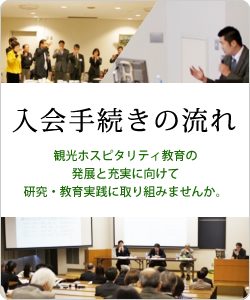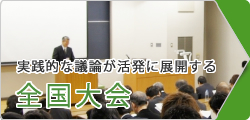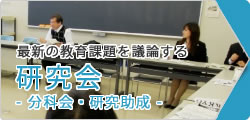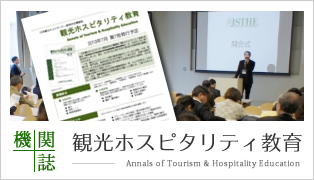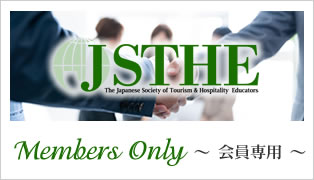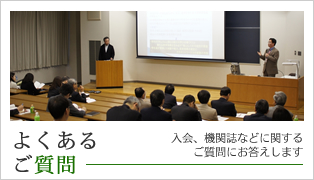The 24th Annual Conference of JSTHE: Announcement
This year’s Annual Convention will be held at Ritsumeikan University’s Osaka Ibaraki Campus (Ibaraki City, Osaka Prefecture) on March 8 and 9, 2025, under the theme “ Designing Future Tourism and Hospitality Education Inspired by the Expo 2025 Osaka, Kansai, Japan”. With population decline, globalization, and digital technology advancing at a rapid pace, the nature of education to nurture the next generation is at a turning point. However, many teachers in the field of education are facing challenges in introducing, implementing, and utilizing digital technology. Taking the opportunity of the Osaka-Kansai Expo to be held from April 2025, we will offer participants the chance to discuss the possibilities and challenges of developing tourism and hospitality education for the future.
Theme: Designing Future Tourism and Hospitality Education Inspired by the Expo 2025, Osaka, Kansai, Japan
Date: March 8 – March 9, 2025 (Saturday – Sunday)
Venue: Ritsumeikan University, Osaka Ibaraki Campus
2-150 Iwakura-cho, Ibaraki, Osaka 〒567-8570
Participation fee:
| Regular and honorary members | 3,000 yen |
| Non-members (general) | 2,000 yen for 1 day, 4,000 yen for 2 days |
| Associate members and non-members (graduate and undergraduate students) | Free of charge |
| Non-member presenters (graduate and undergraduate students) | 1,000 yen |
Organized by: Japanese Society of Tourism and Hospitality Educators (JSTHE)
Program: 1st Day:March 8th (Sat)
| Time | Program |
| 12:15 | Registration Starts |
| 13:00 | Research Reports and Educational Practice Reports |
| 15:10 | Symposium |
| Opening Remarks: Reiko Fujita
(Professor, Seikei University / President, Japanese Society of Tourism and Hospitality Educators) Greetings from the Venue: Masahiro Makita (Dean, Graduate School of Management, Ritsumeikan University) Keynote Speech: Sachiko Nakajima (Thematic Project Producer of Expo 2025, Osaka, Kansai, Japan. / CEO of steAm, Inc.) Panel Discussion: Coordinator: Noriyoshi Nishimura (Dean, Faculty of Human and Social Sciences, University of Marketing and Distribution Sciences) ・Toshimitsu Kasai (Director, Hyogo Prefectural Hyogo-no-tsu Museum) ・Hiroshi Imai (Senior Consultant & Senior Producer, Office For Expo 2025 Osaka, Kansai, Nikkei Inc. ) ・Keita Ogushi (Specially Appointed Associate Professor, Otemon Gakuin University, Japan / Director, Japanese Society of Tourism and Hospitality Educators) Closing Remarks: Tetsu Nakamura (Professor, College of Tourism and Hospitality, Tamagawa University / Vice President, Japanese Society of Tourism and Hospitality Educators) Chairperson: Kenta Fukumoto (Professor, Faculty of International Studies, Hannan University/Vice President, Japanese Society of Tourism and Hospitality Educators) |
|
| 18:00 | Conference Reception |
| Moderator: Rikito Obata (Councilor and Past President, Japanese Society of Tourism and Hospitality Educators) | |
2nd Day:March 9th (Sun)
| Time | Program |
| 08:30 | Registration Start |
| 09:00 | Research Reports and Educational Practice Reports |
| 10:10 | Workshops |
| ①Educational issues and future prospects after the introduction of tourism business course (high school-university collaboration)
②English and Japanese for Specific Purposes in Tourism (ESP/JSP) ③Current status and issues of tourism and international studies (undergraduate departments) ④Practice of university classes in tourism and hospitality education: Case study of tourism psychology and tourism behavior ⑤Digitalization in tourism and hospitality education |
|
| 12:00 | Reports from the workshops |
| Moderator: Shoko Iwata (Part-time lecturer, Osaka Medical and Pharmaceutical University / Director, Japanese Society of Tourism and Hospitality Educators) | |
| 12:20 | Closing Ceremony |
| Closing Remarks: Kenta Fukumoto (Professor, Faculty of International Studies, Hannan University/Vice President, Japanese Society of Tourism and Hospitality Educators) | |
【Outline of each Workshops】
① Educational issues and future prospects after the introduction of tourism business course (high school-university collaboration)
We will exchange opinions on the challenges faced when dealing with tourism business classes in schools, concerns about introducing it, and the role that universities should play. In doing so, case studies being promoted by the Japan Tourism Agency and other organizations will be shared. In addition, through active discussions among practitioners in the field, we will seek better educational practices.
② English and Japanese for Specific Purposes in Tourism (ESP/JSP)
This workshop will examine approaches to English and Japanese language education tailored to careers in the tourism industry, including sectors such as travel, accommodation, dining, transportation, and tour guiding. It aims to explore methods for fostering communication skills that are effective in global professional contexts.
③ Current status and issues in tourism and international studies (undergraduate departments)
Participants will share information on the current situation after the COVID-19, including the status of applications to undergraduate departments of tourism and international studies (entrance) and the employment situation in the tourism industry (exit), and discuss the measures to be taken and issues to be addressed.
④ Practice of university classes in tourism and hospitality education: A case study of tourism psychology and tourism behavior
The content of “Tourism Psychology/Tourism Behavior” classes at universities varies greatly depending on the background of the instructors. In this workshop, several speakers will report case studies of their teaching practices. Then, participants will exchange opinions in a round-table discussion format. This workshop will be held as part of the “Current State of ‘Tourism Psychology/Tourism Behavior’ Courses at Universities” funded by the Japanese Society of Tourism and Hospitality Educators (JSTHE) in FY2024.
⑤ Digitalization in Tourism Hospitality Education
All participants will share information and deepen discussion on the impact of digital technology on tourism hospitality education, its challenges, and its potential. We aim to provide an opportunity to organize the latest trends and future prospects, and to clarify the issues and actions required of educators.
Conference Executive Committee
Chair:Chiho Minetoshi (Ritsumeikan University)
Vice-Chair: Tomonori Oshima (Ritsumeikan University)
Shoko Iwata (Osaka Medical and Pharmaceutical University)
Keita Ogushi (Otemon Gakuin University)
Kyoko Morikoshi (Hokusei Gakuen University, Junior College)
Anna Yonemori (Osaka University of Commerce)







